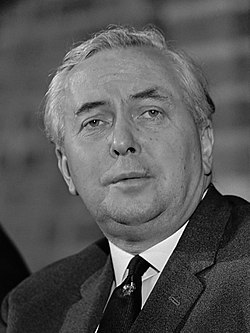Harold Wilson
| How an Empire ends U.K. Politics |
| God Save the King? |
Harold Wilson was Labour Prime Minister of the United Kingdom from 1964-70 and 1974-76. Although most of what he did was the usual Prime Minister stuff, for some reason his time in office, as well as his then-unexplained sudden resignation, led to a number of conspiracy theories, a coup plot and the formation of shadowy right-wing groups of malcontents and old soldiers. He also had the excellent Roy Jenkins as his Home Secretary during his first stint as PM - Jenkins was responsible for relaxing the divorce laws, abolishing censorship of the theatre, decriminalising homosexuality, abolishing capital punishment and the legislation of abortion, all in an effort to bring about what he called a "civilised society".
Coup plot
In 1968 Cecil King, publisher of the Daily Mirror, a left-leaning popular tabloid, tried to work up a plot to overthrow Wilson, fearing chaos and disaster in Britain (France and the US had just exploded into massive riots). King secretly met with Lord Louis Mountbatten, proposing a coup against Wilson, with the country to be run by businessmen. He then printed an op-ed in the Mirror calling for the country to have "a fresh start under a fresh leader." According to Jonathan Freedland, "Lord Mountbatten would be the strongman, acting as interim prime minister. The Queen would read a statement urging the public to support the armed forces, because the government was no longer able to keep order."[1] Instead IPC, the paper's owners, dismissed him.[2][3]
Versions of the coup plot have appeared in various media, often not entirely accurately, including in BBC/Netflix's drama series The Crown, which portrayed Queen Elizabeth II talking Mountbatten out of a coup.[4]
Civil Assistance and GB75
In 1974 Wilson stumbled back to power, and right-wing elements already upset by Edward Heath's lack of steel grew even more agitated. This time a group called Civil Assistance![]() , founded by retired general Walter Walker, stood ready to "act" in the event of a crisis. What sort of "action" was never specified, although a leadership consisting of army officers, claiming "good relations with several chief constables" was sufficient to alarm Defence secretary Roy Mason. The group faded from view after a few months.
, founded by retired general Walter Walker, stood ready to "act" in the event of a crisis. What sort of "action" was never specified, although a leadership consisting of army officers, claiming "good relations with several chief constables" was sufficient to alarm Defence secretary Roy Mason. The group faded from view after a few months.
GB75 was an even more mysterious group, whose membership beyond SAS![]() founder David Stirling is unknown, and perhaps even nonexistent. An exposé was published in 1974 by Peace News magazine, after which Stirling seems to have abandoned his plans.[5][4]
founder David Stirling is unknown, and perhaps even nonexistent. An exposé was published in 1974 by Peace News magazine, after which Stirling seems to have abandoned his plans.[5][4]
KGB
There was a belief among certain elements in MI5 that Wilson was a KGB agent. The sudden and unexpected death of Hugh Gaitskell, Wilson's predecessor as Labour Leader, raised eyebrows, especially as he had recently visited the Soviet Union, and died of complications from lupus, a poorly-understood disease at the time. However, suspicions of a plot run up against biological fact: lupus is not infectious, and therefore Gaitskell could not have been infected with it.
Black ops by MI5
Operation Clockwork Orange was an alleged plot by MI5 to discredit Wilson by planting negative press stories about him, with the assistance of sympathetic journalists. In reaction to this, Wilson feared a coup plot, and said as much on his resignation.
There were also many other rumours allegedly spread by MI5 and others close to the government, including that Wilson supported the IRA and his aide Marcia Williams was a security risk; the campaign also allegedly involved bugging and burglaries of those close to Wilson.[1] An inquiry in 1987 during Margaret Thatcher's premiership claimed to disprove the allegations of security service operations against Wilson. However its impartiality is questionable; it did little to dampen those who believe there was a large-scale cover-up akin to Watergate.[1]
External links
- See the Wikipedia article on Harold Wilson conspiracy theories.
References
- ↑ 1.0 1.1 1.2 Enough of this cover-up: the Wilson plot was our Watergate, Jonathan Freedland, The Guardian, 15 March 2006
- ↑ Harold Wilson at Spartacus Educational
- ↑ Did Lord Mountbatten lead a coup against Harold Wilson? True story featured in The Crown season 3, i News (UK), 7 Dec 2019
- ↑ 4.0 4.1 Lord Mountbatten: Did Prince Philip’s uncle attempt to lead a coup against Harold Wilson’s government?, History Extra, undated (?2019), accessed 29 Oct 2020
- ↑ See the Wikipedia article on David Stirling.
